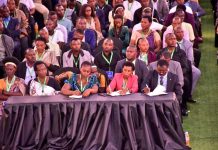Africa-Press – Rwanda. As national exams start on Monday, June 30, the National Examination and School Inspection Authority (NESA) has reminded students, teachers, and schools of important rules to ensure exams period runs smoothly across the country.
Here are ten key guidelines everyone involved should follow before and during the exams;
1. Regulations apply to everyone involved
Each year, NESA issues a detailed set of rules and regulations to guide the examination process. According to Jean-Claude Nzeyimana, the head of the examinations department at NESA, the guidelines apply not only to candidates but also to teachers, invigilators, and supervisors.
“These regulations apply to everyone involved in the examination process, from the national level down to individual schools,” he said.
2. A multi-layered supervision system is in place
Nzeyimana explained that NESA has established multiple levels of monitoring to ensure the smooth administration of exams. District officials coordinate activities across schools, while supervisors oversee several exam centers to make sure all procedures are properly followed.
3. Mobile vigilance directors help detect irregularities
To reinforce accountability, Mobile Vigilance Directors are deployed to various centers to detect and report any misconduct. Some MV Directors, also known as floating directors, move between centers unannounced, for scrutiny.
4. Strict access rules govern the strong room
Each examination center has a supervisor responsible for daily activities, supported by a deputy supervisor and a security agent. These are the only three people allowed to access the strong room, where exam papers are kept, Nzeyimana noted.
“No one is allowed to enter the strong room alone,” he said. “The center supervisor, deputy, and the security officer must all be present. This rule is strictly enforced.”
5. Strong room security is tightly controlled
The strong room is locked with two padlocks. One key is held by the center supervisor, the other by the deputy. The security officer remains outside to monitor all movement around, to and from the room. Exam envelopes must be opened in front of candidates, he added.
“These measures are in place to ensure fairness of the exams and promote transparency at every stage,” Nzeyimana added.
6. Support is available for candidates with disabilities
Not all exam rooms have special invigilators, but in schools with candidates who have disabilities, NESA deploys trained personnel.
“The examination guidelines include tailored provisions for learners with disabilities,” Nzeyimana explained.
“The questions are written in a simplified language to improve comprehension, and in some cases, objective-format questions are used to lessen the writing burden and promote equitable assessment.”
7. Candidates must avoid disqualifying mistakes
Nzeyimana said that candidates shouldn’t write their names or index numbers anywhere other than the designated space on the cover of the exam paper.
“Because the marking process is anonymous,” he said, “any violation of this rule compromises the process.”
He added that incorrectly placed identification details can lead to disqualification or exam invalidation, which undermines fairness for all candidates. Strict compliance is essential to ensure markers assess the work objectively and maintain the credibility of national exams.
8. Invigilators will search for unauthorized materials
Invigilators are required to search candidates before they enter the examination room to ensure no prohibited items are brought in. Only materials listed in the guidelines are permitted in the room.
“Malpractice in any form is strictly prohibited,” Nzeyimana said.
9. Flexible exam options for hospitalized candidates
Nzeyimana said NESA ensures that no students miss exams due to illness or emergencies, if they can do it where they are. In some cases, exams have even been administered in hospitals.
“In cases where a candidate is hospitalized, we assess whether the exam can be taken from the hospital,” he said. “The final decision is given by the medical staff, who determine if the candidate is fit to sit for the exam.”
10. On exams day, stay calm, trust your preparation
Nzeyimana advised learners to remain calm and confident.
“There is no need for pressure, as candidates have had time to prepare,” the officials said. “They should approach the exams calmly, rely on what they’ve learned, and avoid any form of cheating.”
He added that the exams are based on the curriculum that the students have studied. “For those who have prepared, the questions should be doable,” he said.
For More News And Analysis About Rwanda Follow Africa-Press






